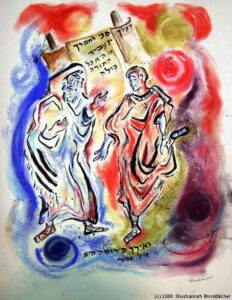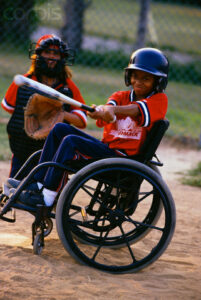I’ve been searching for a story that might come to us as antidote to the selfishness and self-absorption that feels so widespread today. Then quite by accident I came upon this wonderful story told by Rabbi Paysach Krohn about an unforgettable speech given by a grateful father at a fundraising event at the school (for the disabled) run by the rabbi. It appears in his book, Echoes of the Maggid, published in 1999.
Perfection at the Plate
At a Chush fund-raising dinner, the father of a Chush child delivered a speech that will always be remembered by all who attended. After extolling the school and its dedicated staff, he cried out, “Where is the Hashem in my son Shaya?
(God is often referred to as Hashem, a creative way of not saying God’s name. If you’re a Harry Potter fan, it’s kind of the opposite of how Voldemort was referred to as “He-Who-Must-Not-Be-Named.”)
Everything that Hashem does is done with perfection.
- But my child cannot understand things as other children do.
- My child cannot remember facts and figures as other children do.
- Where is Hashem’s perfection?”
The audience was shocked by the question, pained by the father’s anguish and stilled by his piercing query.
I believe,” the father answered, “that when Hashem brings a child like this into the world, the perfection that He seeks is in the way people react to this child.”
The audience was stilled by the query.
The father continued. “I believe that when a child like Shay, physically and mentally handicapped, comes into the world, an opportunity to realize true human nature presents itself, and it comes in the way other people treat that child.”
Then he went on and told the following story…
Shay and his father had walked past a park where some boys were playing baseball. Shay asked, “Do you think they’ll let me play?” Shay’s father knew that most of the boys would not want someone like Shay on their team, but the father also understood that if his son were allowed to play, it would give him a much-needed sense of belonging and some confidence to be accepted by others in spite of his handicaps.
Shay’s father approached one of the boys on the field and asked (not expecting much) if Shay could play. The boy looked around for guidance and said, “We’re losing by six runs and the game is in the eighth inning. I guess he can be on our team and we’ll try to put him in to bat in the ninth inning.”
Shay struggled over to the team’s bench and, with a broad smile, put on a team shirt . His father watched with a small tear in his eye and warmth in his heart. The boys saw the father’s joy at his son being accepted. In the bottom of the eighth inning, Shay’s team scored a few runs but was still behind by three. In the top of the ninth inning, Shay put on a glove and played in the right field. Even though no hits came his way, he was obviously ecstatic just to be in the game and on the field, grinning from ear to ear as his father waved to him from the stands.
In the bottom of the ninth inning, Shay’s team scored again. Now, with two outs and the bases loaded, the potential winning run was on base and Shay was scheduled to be next at bat.
At this juncture, do they let Shay bat and give away their chance to win the game? Surprisingly, Shay was given the bat. Everyone knew that a hit was all but impossible because Shay didn’t even know how to hold the bat properly, much less connect with the ball.
However, as Shay stepped up to the plate, the pitcher, recognizing that the other team was putting winning aside for this moment in Shay’s life, moved in a few steps to lob the ball in softly so Shay could at least make contact. The first pitch came and Shay swung clumsily and missed. The pitcher again took a few steps forward to toss the ball softly towards Shay. As the pitch came in, Shay swung at the ball and hit a slow ground ball right back to the pitcher.
The pitcher picked up the soft grounder and could have easily thrown the ball to the first baseman. Shay would have been out and that would have been the end of the game.
Instead, the pitcher threw the ball right over the first baseman’s head, out of reach of all team mates. Everyone from the stands and both teams started yelling, “Shay, run to first! Run to first!” Never in his life had Shay ever run that far, but he made it to first base. He scampered down the baseline, wide-eyed and startled.
Everyone yelled, “Run to second, run to second!” Catching his breath, Shay awkwardly ran towards second, gleaming and struggling to make it to the base. By the time Shay rounded towards second base, the right fielder had the ball. He could have thrown the ball to the second-baseman for the tag, but he understood the pitcher’s intentions so he, too, intentionally threw the ball high and far over the third-baseman’s head. Shay ran toward third base deliriously as the runners ahead of him circled the bases toward home.
All were screaming, “Shay, Shay, Shay, all the way Shay!”
Shay ran home, stepped on home plate and all 18 boys lifted him on their shoulders and made him the hero, as he had just hit the “grand slam” and won the game for his team.
“That day,” said the father who now had tears rolling down his face, “those 18 boys reached their level of perfection. They showed that it is not only those who are talented that should be recognized, but also those who have less talent. They too are human beings, they too have feelings and emotions, they too are people, they too want to feel important.”
Young Shay would never forget what it felt like to be a hero that day.
Neither would the other boys…or any of us.
Just a thought…
Pat
NOTE: We are experiencing some problems when people try to reply directly to a post. Until these issues are resolved, please send any comments directly to Pat at pjmoriarty48@gmail.com.
Copyright © 2021 Patrick J. Moriarty. All Rights Reserved.
Would you like to submit a post to Just A Thought? To learn more, please click here.




